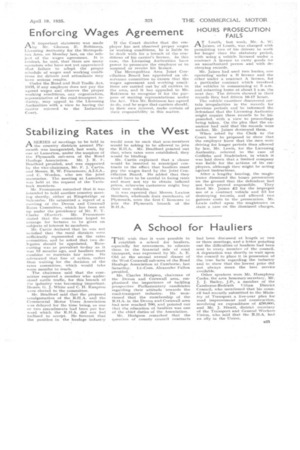Enforcing Wages Agreement HOURS PROSECUTION
Page 31

If you've noticed an error in this article please click here to report it so we can fix it.
FAILS
AN important statement was made by Mr. Gleeson E. Robinson, Licensing A.uthority for the Metropolitan Area, on Monday last, on the subject of the wages agreement. It is evident, he said, that there are many operators who have not yet appreciated that failure to adopt the proper schedule of wages and working conditions for drivers and attendants may have serious results.
Under the Road and Rail Traffic Act, 1933, if any employer does not pay the agreed wages and observe the proper working conditions, any organization, representative of the road-transport industry, may appeal to the Licensing Authorities with a view to having the matter referred to the Industrial Court.
If the Court decides that the employer has not observed proper wages or working conditions, he is liable to be dealt with for a breach Of the conditions of his carrier's licence. In this case, the Licensing Authorities have power to prosecute the employer or to suspend or revoke his licence.
The Metropolitan Area Joint Conciliation Board has appointed an observance committee to ensure that the wages agreement and working conditions are carried out by all carriers in the area, and it has appealed to Mr. Robinson to recognize it for the purpose of making representations under the Act. This Mr. Robinson has agreed to do, and he urges that carriers should, in their own interest, make certain of their responsibility in this matter.
A T Louth, last week, Mr. A. NV:
James, of Louth, was charged with permitting two of his drivers to work for longer than the statutory period, with using a vehicle licensed under a contract A licence to carry goods for an unauthorized person and with destroying records.
Mr. James had used two lorries, one operating under a B licence and the other under a contract A licence, for a particular contract which involved , the vehicles in commencing at si a.m. and returning home at about 1 a.m, the next day. The drivers showed in their records they had driven 16-17 hours.
The vehicle examiner discovered certain irregularities in the records for previous periods and he informed the defendant that the Licensing Authority might require these records to be impounded, with a view to proceedings being taken. On the plea that the examiner had said that the records were useless, Mr. James destroyed them.
When asked by the Clerk to the Court how he proposed to show that the employer knew that the men were driving for longer periods than allowed by law, Mr. Lewis, for the Licensing Authority, referred to the case of Griffiths and Studebaker, in which it was laid dow'n that a limited company was liable for the actions of its employees, although they might be acting against instructions.
After a lengthy hearing, the magistrates dismissed the hours prosecution on the ground that the defendant had not been proved responsible. They fined Mr. Jairies £2 for the improper use of a contract Vehicle and £3 for destroying records, and allowed two guineas costs to the prosecution. Mr. Lewis called upon the magistrates to state a case on the dismissed charges.




















































































